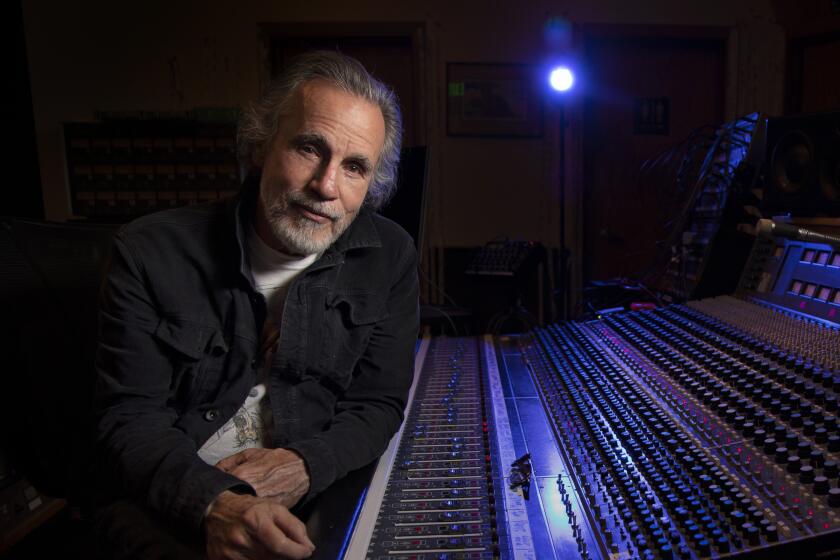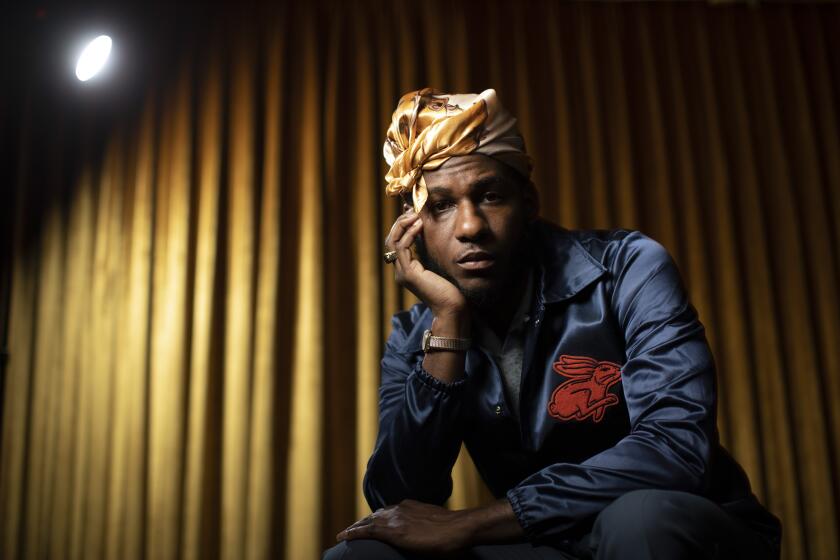Buddy Guy, turning 85, is still working to keep the blues alive
- Share via
How do you define the blues? Carlos Santana, John Mayer, Kingfish and Gary Clark Jr. answer the question differently in a new documentary, but all agree that one of the genre’s foundations is fellow guitarist Buddy Guy.
The Rolling Stones. Eric Clapton. Stevie Ray Vaughan. All acknowledge Guy as the man who has most influenced their sound and how they play, and in PBS’ “American Masters — Buddy Guy: The Blues Chase the Blues Away,” which premieres at 9 tonight on PBS and the PBS video app, the 84-year-old blues master, Rock & Roll Hall of Fame inductee and eight-time Grammy winner tells his story in his own words.
It’s a story that has been told before, so much so that Guy isn’t as interested in talking about his life as he is in trying to make sure that the blues and the musicians who helped define it are still talked about. That left other contemporary musicians like Mayer and Clark to add their input on how Guy, who spent his early years as a sharecropper in Lettsworth, La., became one of the most influential guitarists of all time.
In a phone interview, Guy talked about influencing the British Invasion, white versus black fans and the legacy of the blues.

What was it about your story that you wanted to get out there?
Well, the blues is ignored compared to what used to be. Your big radio stations don’t play blues any more. When I came to Chicago some 60 years ago, all your great blues players were living and playing. They would always tell me, “Try not to never let the blues die.” But I look around and yesterday is gone. Wonder where yesterday went. It’s really me and Bobby Rush as the only senior citizens playing. So whatever I can do with my days — I’ll be 85 years old on the 30th of this month — I’m still trying to keep the blues alive, man. It’s not easy when you’re by yourself.
Somebody was interviewing me a few months ago and said, “I need to talk to somebody who knew you from way back when to get some information on you.” I said, “Well you need to go to the graveyard, then, ’cause everybody older than me is gone.”
As young artists like Phoebe Bridgers have befriended him, Jackson Browne, 72, has released his first studio album in six years, ‘Downhill From Everywhere.’
You picked up a guitar very young. When did you think it could be something you’d make a career out of?
My dad gave this guy a couple of dollars and bought me a guitar with two strings on it. I must have been about 15 or 16. It wasn’t no future in it. I just wanted to do something that you couldn’t find nobody else doing. When you found a guitar player back in those days, they were sticking out like a sore thumb.
It wasn’t no future. When I first met Lightnin’ Slim, and even B.B. King told me when he first started, they wasn’t making any money. If you played music well enough in the ’20s and ’30s for those house parties and Saturday night fish fries, you got a couple of good glasses of wine. And if you played well enough and sang well enough, you got you a good-looking girlfriend.
Even when you were in the blues-rich Chicago scene, you were driving a tow truck with your guitar in the back?
I was driving the tow truck in the daytime, getting off at 5 or 6, then I’d go in a dressing room, take a shower and go play a gig for $3 that night. I was making $2.11 an hour driving that truck. Just to make ends meet, ’cause I had three children.
All Black musicians … Didn’t nothing good happen to us until the British started playing the blues and exposing the blues to the white audience. And right now, wherever I play, my audience is 90% white. Don’t nobody Black come to hear the blues anymore. I was walking across the street with B.B. King maybe 15 or 20 years ago outside his club. This Black lady walked up and said, “These white people took the blues away from us,” and he said, “No, ma’am. Y’all just quit listening to it.”
Why do you think Black people haven’t continued to embrace the blues?
I wish I could answer that. If I knew, I would’ve answered that maybe 60 or 70 years ago. I think a lot of people don’t want to hear about what happened, or what’s happening. The lyrics tell you about something you did good or something you did bad. We always sang about everyday life.

What were you thinking when the Rolling Stones were watching you recording “My Time After While” during a session?
Muddy Waters had helped them bring their instruments upstairs to do an audition. I had never seen white men with hair that long and high-heeled boots. I wanted to curse. First thing I wanted to know was, “Who in the hell is this y’all bringing in on my session?”
How did you end up hooking up with the Yardbirds in England? Apparently those shows were pretty influential to future stars there.
First of all, I was booked to go to England. I said, “Well, I’ve never been out of the country” — I think I had been to Canada — “so this is my chance to go overseas.” I didn’t know those guys, and now they are some of my best friends. [Eric] Clapton. [Jeff] Beck. Jimmy Page. Keith [Richards]. I didn’t know they had heard of me, and now every time I see ‘em, they tell me about how they all slept in a van [to come see me play]. Then they got famous and came to the U.S. and was helping us out — Black Americans — by letting Americans know where they got their movement from. All four of ‘em said they didn’t know a Stratocaster could play blues until they saw me. Eric Clapton once told me that I was playing in the key of B-flat and threw the guitar in the air and caught it still playing B-flat as it was coming down. I don’t even remember that. I guess I was just at the right place at the right time.
Soul singer Leon Bridges, often tagged as ‘retro,’ wanted to push the ‘boundaries on Black expression’ on his new album, ‘Gold-Diggers Sound.’
Who will carry on the blues?
The way the blues is being treated right now, that’s a good question. If you ain’t got satellite radio, you ain’t gonna hear it no more. Let me explain this: I got a son. He’s 40 now. He was in the house with me. DJs would put the speakers out during the Fourth of July and he would play Michael Jackson and Prince. Every time they would put my record on, he would snatch it off. I wouldn’t say nothing. When he turned 21, he went to a club and they were playing my record and he started crying. He said, “Oh, my God. I didn’t know you could do that.” And he’s been a blues player ever since.
More to Read
The biggest entertainment stories
Get our big stories about Hollywood, film, television, music, arts, culture and more right in your inbox as soon as they publish.
You may occasionally receive promotional content from the Los Angeles Times.













